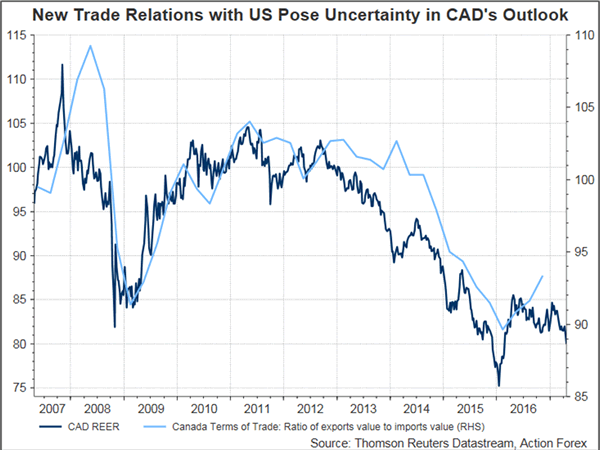USDCAD consolidated after a brief break about 1.36, following US’ announcement to impose anti-subsidy tariff on softwood lumber imports from Canada. US Commerce Secretary Wilbur Ross indicated that the "countervailing duties" would range from 3-24% and would be imposed on 5 Canadian lumber exporters including West Fraser Timber Co., after concluding that Canada subsidizes its industry in a way that hurts the US. Ross added that the move is a sign to other trading partners that the US is planning stricter enforcement of trade laws. Canada responded by saying that the tariff is "unfair and punitive". In a joint statement from Foreign Minister Chrystia Freeland and Natural Resources Minister Jim Carr, it was noted that Canada "will vigorously defend the interests of the Canadian softwood lumber industry, including through litigation". It reiterated that "a negotiated settlement is not only possible but in the best interests of both countries". Risk to the loonie is to the downside in the near-term on heightened possibility of a trade war. Canada’s economy is more vulnerable to a US-Canada trade war as 75% of its exports go to the US and this contributes to about 20% of Canada’s economy.

A Brief History of US-Canada Softwood Lumber Trade Dispute
While the softwood lumber trade dispute between the US and Canada can be dated back to as early as the 1800s, explicit agreements have not been made until 1982. The US was dissatisfied with the Canadian government’s policy that private lumber firms in British Columbia, Ontario, Alberta and Quebec are allowed to source trees from public land. However, in the US, the majority of lumber is cut from private lands, thus increasing the production cost. Softwood lumber was not covered under NAFTA, a trade agreement that the US has indicated intention to renegotiate in coming months, but appeared under a side agreement that expired in October 2015.
More a Political than Trade/Economic Issue
The US’ softwood lumber imports from Canada amounted to about US$5B last year, approximately 85% of total US lumber imports. Yet, this only contributed to less than 2% of Canada’s exports to the US, at US$295B. Meanwhile, Canada has a trade surplus of US$5.5B in coniferous wood, of which the majority was softwood lumber, last time. The figure is also small when compared with the total trade balance of US$85.2. Assuming the tariff is 20%, it covers only about 0.3% of US total imports. The overall impacts on US GDP growth or inflation are minimal. Interestingly, the key destinations of Canada’s lumber exports in the US are Washington, Texas, New York, Oregon, Michigan, Pennsylvania, Massachusetts, Minnesota, North Carolina and Illinois. Most these states are with great presence of the Democratic Party and are politically important in the 2018 midterm elections.
While denying that the softwood lumber tariff is the beginning of NAFTA negotiations, the market has turned nervous that the US would adopt a stricter trade policy in order to promote his "American First" rhetoric. Indeed, Trump mentioned last week that he would "address" the trade problem on dairy products, accusing that Canada’s move to change the class of some milk products has "put farmers in Wisconsin and New York state out of business". Again, we are suspicious that Trump’s move has political incentive. The US runs a US$110M surplus in milk and milk-related products with Canada last year, with Canada exporting US$58M whilst importing US$168M from the US. The 2 states mentioned by Trump are also running surpluses with Canada in this category. Wisconsin, the first congressional district represented by Republican Paul Ryan, has a US$20M milk and milk-related surplus with Canada. The current Speaker of the House is also the proposer of the controversial border tax arrangement. New York, the 16th congressional state represented by Chuck Schumer, the Senate minority leader, has a US$22M surplus.
